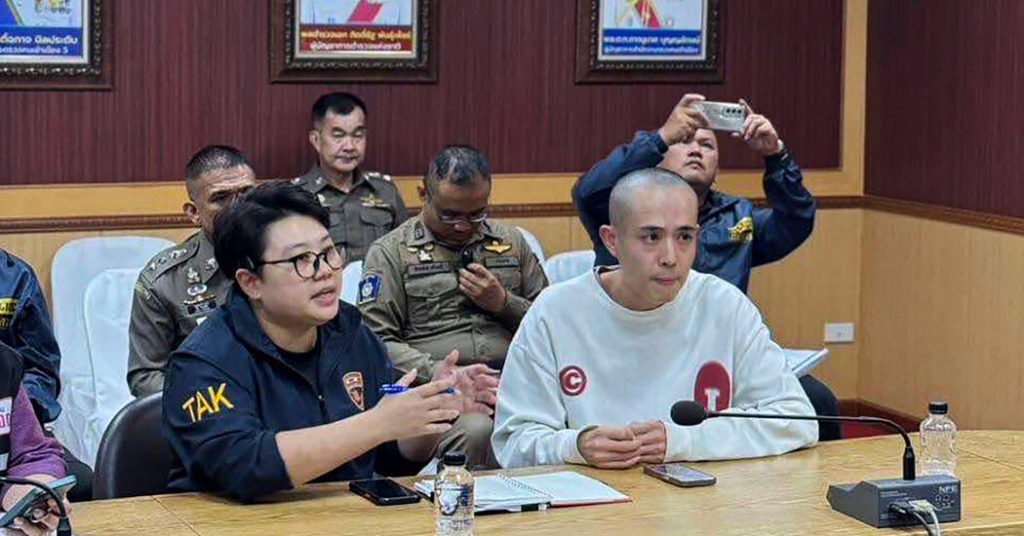This is one of those stories that starts with a ripple and builds into a wave. It begins with a Chinese actor, Wang Xing, who disappeared in Thailand under mysterious circumstances, only to later resurface with a story that would shake the Thai tourism sector and ignite a firestorm of concern in China.
Let’s rewind to the incident’s origins. Wang Xing traveled to Bangkok earlier this month, lured by what he believed was an exciting casting opportunity. What he didn’t know was that he was being pulled into a dangerous web of human trafficking and online scams run by criminal networks operating across Southeast Asia. From Bangkok, he was abducted and taken against his will into Myanmar, where such scams often flourish in areas controlled by organized crime syndicates.
It was his girlfriend who sounded the alarm. Her pleas for help, first reported to Chinese authorities and the embassy in Thailand, soon made their way to social media. The posts went viral, shared widely by concerned citizens and even Chinese celebrities. The public pressure was immense, and by January 7, Thai authorities announced Wang’s rescue. Yet, the nightmare he described left many back in China deeply disturbed. He recounted being forced to shave his head, learn to type quickly—likely for executing online scams—and live under constant duress.
While Wang’s story ultimately had a hopeful resolution, the ripple effects of his ordeal were swift and far-reaching. For starters, a palpable anxiety enveloped prospective Chinese travelers and event organizers. Thailand, already grappling with the aftermath of the pandemic, had been gearing up for a boost in tourism coinciding with the Lunar New Year holiday—a peak season for Chinese visitors. But Wang’s case flipped that optimism on its head.
Eason Chan, a Hong Kong pop star, canceled a completely sold-out concert in Bangkok that was scheduled for February, citing safety concerns for fans traveling to Thailand. Zhao Benshan, a legendary comedian in China, also postponed his Bangkok appearance, further amplifying the growing sense of worry and uncertainty hovering over Thailand as a safe destination.
The Chinese public quickly turned to platforms like Weibo to express their fears and frustrations. Travel-related hashtags surged in popularity as debates unfolded about whether it was safe to visit Thailand and how to cancel trips. According to reports from travel agencies in China, many travelers weren’t just talking—they were taking action. Zhang Zhihong, a sales rep for Baochunguo Travel Agency, revealed that his company saw roughly 25% of Chinese bookings to Thailand canceled in just a week. The reason? Public perception of safety.
For Thailand, this couldn’t have come at a worse time. After years of pandemic-induced tourism setbacks, the country had been making explicit efforts to woo Chinese tourists back. They’d eased visa requirements, rolled out attractive travel discounts across popular Chinese tourist platforms, and even dedicated an entire campaign cheekily named “Nihao Month”—using the Mandarin term for “hello.” The campaign aimed to highlight Thailand as a welcoming and safe destination for Chinese visitors. In 2019, nearly 11 million Chinese tourists visited Thailand, making them the largest group of international travelers. Expectations were high to revive those numbers, but Wang Xing’s harrowing story risked throwing those plans into chaos.
The controversy isn’t just a blow to tourism; it also throws fresh light on a darker undercurrent in the region—the growing problem of human trafficking and online scam syndicates. These operations, which thrive in parts of Myanmar and Cambodia, have ensnared hundreds of thousands of victims over the years. Often, individuals are duped by promises of high-paying job opportunities, only to find themselves trapped in exploitative schemes once they arrive. Thailand, located strategically at the heart of Southeast Asia, is frequently used as a transit point for moving victims across its porous borders into areas notorious for lacking proper governance.
Public attention to these issues has surged, bringing pressure on both the Thai and Chinese governments to crack down on human trafficking and protect travelers like Wang from falling into dangerous situations. Ja Ian Chong, a political science professor from the National University of Singapore, commented that the massive public response to Wang’s case could motivate Thai authorities to take the threat of trafficking and scams more seriously.
And indeed, some action has already begun. Following Wang’s rescue, Thailand’s police force appeared eager to manage the narrative and reassure Chinese visitors of their safety. In one subtitled video, a Thai officer asked Wang directly to affirm Thailand’s safety for Chinese travelers—a possibly well-intentioned but awkward attempt at damage control.
However, for some families, the rescue of Wang Xing felt bittersweet, even triggering. Stories of other Chinese individuals who had disappeared across Southeast Asia flooded social media feeds. A detailed log documenting more than 170 missing persons cases circulated widely on Weibo, amplifying demands for more systemic action against trafficking networks. For those still waiting for answers about kidnapped loved ones, the gravity of Wang’s ordeal hit painfully close to home.
In a broader sense, Wang’s rescue has galvanized cooperation between Thai and Chinese authorities to tackle the trafficking crisis head-on. Thai officials have begun coordinating with Chinese diplomats to bolster efforts to locate missing persons and exchange critical intelligence. On a more local scale, Thai police have demonstrated a commitment to resolve cases swiftly. For instance, just days after Wang’s rescue, Thai officials worked with Chinese authorities to secure the release of two abducted Chinese women, who were safely returned to their families.
Yet, for Thai businesses heavily dependent on tourism, there’s a tangible nervousness about the future. Conversations about safety abroad don’t just disappear overnight, and the potential long-term damage to Thailand’s reputation might take years to undo. “We are nervous that it will have long-term effects,” admitted Thienprasit Chaiyapatranun, president of the Thai Hotels Association.
And rightly so. For millions of Chinese citizens considering a trip abroad, stories like Wang Xing’s bring up larger questions—not just about Thailand, but about safety, trust, and the responsibility of governments to protect their citizens from predatory networks. In a world still recovering from pandemic shutdowns, the stakes for rebuilding tourism sectors are higher than ever. Countries like Thailand are walking a delicate line, caught between presenting an open, welcoming image to visitors and addressing deeply rooted systemic issues like human trafficking that can shatter that image in an instant.
So, what started as one man’s nightmare has become a cautionary tale and a call to action. For Thailand, for China, and for Southeast Asia as a whole, Wang Xing’s story serves as a stark reminder of the dangers lurking behind the allure of opportunity—and the resilience needed to confront those dangers head-on. What happens next will determine whether this ripple grows into a tsunami or fades away into calm, open waters.











